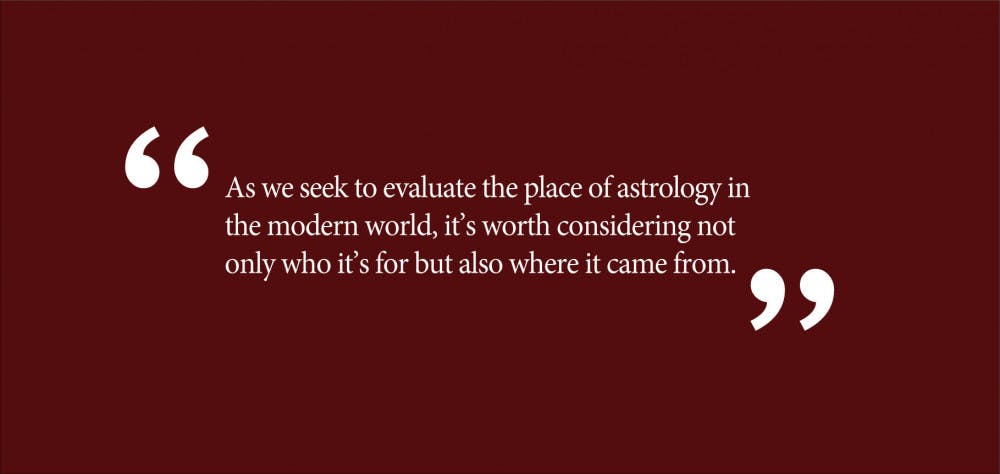Questioning the validity of astrology and its place in modern conversations may seem straightforward — after all, as Jamie Flynn ’20.5 stated in his recent opinion, “astrology is pure pseudoscience.” But as Allie Arnold ’20 pointed out in her response to his column, the matter is complicated by ideas of identity and community formation. As we seek to evaluate the place of astrology in the modern world, it’s worth considering not only who it’s for but also where it came from. Astrology is rooted in ancient knowledge and distant cultures — and at its conception, it was less distinguishable from science. Understanding where this practice came from, which contextualizes modern usage, can help to further make the case for the place of astrology in the modern world.
Our earliest records of astronomy are immediately entangled with astrology. Observations of the night sky from ancient Mesopotamia are recorded in texts like MUL.APIN and the Astronomical Diaries. But these scientific observations were also coupled with lists of omens, like the cuneiform text called Enūma Anu Enlil, to explain what the astronomical phenomena might mean. The development of the zodiac — the basis of much modern astrology — also provided a method for observing the altitude and azimuth of planets. So, does it belong to astrology or astronomy? And how do we interpret the fine-tuning of skills of observation, record-keeping and analysis that aided both astrology and astronomy, but are also requirements for the modern scientific method? Since ancient cultures often performed astronomical observations with astrological motivations, disentangling the two practices can become complex.
Ultimately, this division, the tidy categorization of either astronomical science or astrological mysticism, is neither easy nor helpful. Calling astrology “fake” or “nonsense” becomes more difficult because its study was integrally related to the astronomy that brought us models of cyclical planetary motion. Asserting that astrology is a pseudoscience refuses to acknowledge the very origin of astrology as integral to the development of the science of astronomy. In fact, distinguishing between the two in an ancient context can be not only difficult but can prevent a full understanding of ancient scientific knowledge.
Differentiating astronomy from astrology certainly becomes easier in the modern period. We don’t, as a whole, view eclipses as ominous anymore. The interpretation of the placement of a planet within a particular constellation rarely makes headlines. But writing off the entire practice of astrology prevents us from seeing the complete picture of how we arrived at our understanding of the cosmos.
I don’t think my libra-ness defines who I am as a person or predicts any event for my future. But I can respect that there are individuals and communities who rely on such ideas as markers of inclusion and ways of dealing with the world. More than that, I can respect their practice by understanding that horoscopy, genethliology and zodiacal information are informed by the history of scientific investigation. In her column last week, Arnold reminded us that “Even if the impetus for these conversations is pseudo-scientific, it doesn’t mean that the conversations themselves are unimportant.” She’s right, of course, that the role of contemporary astrology goes beyond questions of its scientific status. But her idea is also incomplete, because given the history of astrology, we can further legitimize the people and groups who practice it currently.
The “scientific” nature of astrology should be secondary to its importance among modern communities. But the question of whether it is “scientific” is important to me, especially, since I study the history of astronomy — including astrology! — as a PhD student of the history of science. I find myself frequently having to campaign for the validity of including astrology in my research. Using a historical perspective to question astrology’s position as “pseudoscience” can bolster the argument for respecting those who find astrology useful for confronting oppressive institutions.
So if people and cultures want to discuss where the sun was rising against the backdrop of fixed stars on a particular day, let them. It’s a discussion informed by a modern mysticism, sure, but also by an ancient science. Understanding this history allows us to see just how related astronomy and astrology are and can help us contribute to a conversation rather than dismissing fields entirely.
E.L. Meszaros GS can be reached at e.l.meszaros@brown.edu. Please send responses to this opinion to letters@browndailyherald.com and op-eds to opinions@browndailyherald.com.





